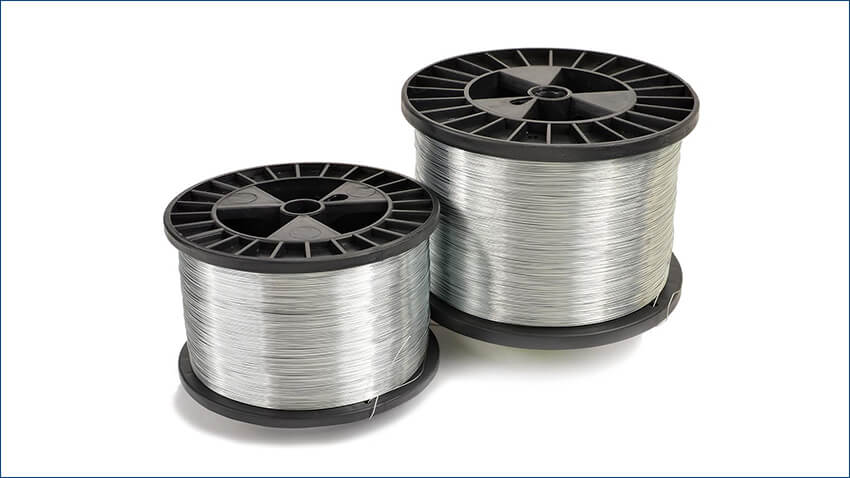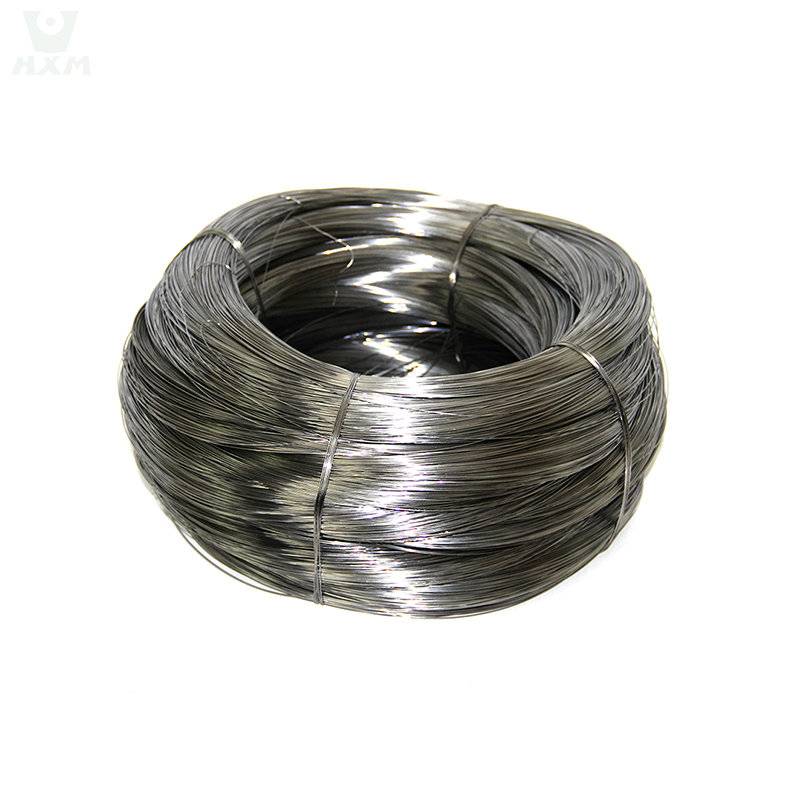Duplex Stainless Steel Wire Supplier
Size: Diameter 0.2mm-5.5mm, 5.5mm-12mm
Standard: GB1220, ASTM A484/484M, EN 10060/ DIN 1013 ASTM A276, EN 10278, DIN 671
Main Grade: 2205, 2507, 254SMO
Finish: Black, NO.1, mill finish, cold draw
production process of duplex stainless steel wire
Duplex stainless steel wire, also known as austenitic-ferritic stainless steel wire, is a series of grades with approximately equal proportions of ferrite and austenite, and its structure contains a mixture of austenite and ferrite. It has two-phase properties, excellent corrosion resistance, and high mechanical strength. Duplex stainless steel wire has high chromium content (19%-28%) and low to moderate nickel content (0.5%-8%).
Duplex 2205 (UNS S32205) is one of the most widely used duplex stainless steels, and Huaxiao also offers UNS S31803, as well as super duplex stainless steels like Zeron 100 (UNS S32760) and 2507 (UNS S32750) for harsh corrosive environments.
specification of duplex stainless steel wire
Duplex stainless steel wire, also known as austenitic-ferritic stainless steel wire, is a series of grades with approximately equal proportions of ferrite and austenite, and its structure contains a mixture of austenite and ferrite. It has two-phase properties, excellent corrosion resistance, and high mechanical strength. Duplex stainless steel wire has high chromium content (19%-28%) and low to moderate nickel content (0.5%-8%).
Main grade description in different standard
ASTM | DIN / EN | JIS | GB | ISO Name |
S32750 / 2507 | 1.4410 | – | S25073 | X2CrNiMoN25–7-4 |
S32205 / 2205 | – | – | S22053 | - |
S31803 | 1.4462 | SUS329J3L | S22253 | X2CrNiMoN22-5-3 |
chemical component of duplex stainless steel wire
2507 | C % | Si % | Mn % | P % | S % | Ni % | Cr % | Mo % | N % | Cu % |
ASTM | 0.03 | 0.08 | 2.00 | 0.04 | 0.02 | 6.0-8.0 | 24 0-26 0 | 3.0-5.0 | 0.24-0.32 | 0.5 |
DIN/EN | 0,03 | 1,00 | 2,00 | 0,035 | 0,015 | 6,0-8,0 | 24,0-26,0 | 3,0-4,5 | 0,24-0,35 | – |
JIS | – | – | – | – | – | – | – | – | – | – |
GB | 0.03 | 0.08 | 1.20 | 0.04 | 0.02 | 6.0-8.0 | 24.0-26.0 | 3.0-5.0 | 0.24-0.32 | 0.5 |
2205 | C % | Si % | Mn % | P % | S % | Ni % | Cr % | Mo % | N % | Cu % |
ASTM | 0.03 | 1.00 | 2.00 | 0.030 | 0.020 | 4.5-6.5 | 22.0-23.0 | 3.0-3.5 | 0.14-0.20 | – |
DIN/EN | – | – | – | – | – | – | – | – | – | – |
JIS | – | – | – | – | – | – | – | – | – | – |
GB | 0.03 | 1.00 | 2.00 | 0.03 | 0.02 | 4.5-6.5 | 22.0-23.0 | 3.0-3.5 | 0.14-0.20 | – |
S31803 | C % | Si % | Mn % | P % | S % | Ni % | Cr % | Mo % | N % | Cu % |
ASTM | 0.03 | 1.00 | 2.00 | 0.030 | 0.020 | 4.5-6.5 | 21.0-23.0 | 2.5-3.5 | 0.08-0.20 | – |
DIN/EN | 0,03 | 1,00 | 2,00 | 0,035 | 0,015 | 4,5-6,5 | 21,0-23,0 | 2,5-3,5 | 0,10-0,22 | – |
JIS | 0.03 | 1.00 | 2.00 | 0.040 | 0.030 | 4.5-6.5 | 21.0-24.0 | 2.5-3.5 | 0.08-0.20 | – |
GB | 0.03 | 1.00 | 2.00 | 0.030 | 0.020 | 4.5-6.5 | 21.0-23.0 | 2.5-3.5 | 0.08-0.20 | – |
mechanical property of duplex stainless steel wire
2507 | Y.S./Mpa ≥ | T.S./Mpa ≥ | E.L./% ≥ | HB ≤ | HRC ≤ | HBW ≤ | HV ≤ |
ASTM | 550 | 795 | 15 | – | 32 | 310 | – |
JIS | – | – | – | – | – | – | – |
GB | 550 | 795 | 15 | – | 32 | 310 | – |
2205 | Y.S./Mpa ≥ | T.S./Mpa ≥ | E.L./% ≥ | HB ≤ | HRC ≤ | HBW ≤ | HV ≤ |
ASTM | 450 | 655 | 25 | – | 31 | 293 | – |
JIS | – | – | – | – | – | – | – |
GB | 450 | 620 | 25 | – | 31 | 293 | – |
S31803 | Y.S./Mpa ≥ | T.S./Mpa ≥ | E.L./% ≥ | HB ≤ | HRC ≤ | HBW ≤ | HV ≤ |
ASTM | 420 | 620 | 25 | – | 31 | 293 | – |
JIS | 450 | 620 | 18 | – | 32 | 302 | 320 |
GB | 450 | 620 | 25 | – | 31 | 293 | – |
features of duplex stainless steel wire
- Bright Surface: Duplex stainless steel wire typically exhibits a highly polished surface due to its dual-phase structure, enhancing both aesthetics and corrosion resistance.
- High Corrosion Resistance: The combination of ferrite and austenite phases in duplex stainless steel imparts excellent corrosion resistance. This material can withstand the corrosive effects of various chemicals, including acids, alkalis, and salts. As a result, duplex stainless steel finds widespread applications in challenging environments.
- Good Ductility and Workability: Another advantage of duplex stainless steel is its good ductility and workability. This implies that it can be easily shaped into various complex forms and is amenable to various processing techniques such as cutting, bending, and welding. This versatility makes duplex stainless steel a highly adaptable material, meeting diverse application requirements.

types of duplex stainless steel wire
The first class is a low-alloy type, the agent grade is UNSS32304 (23Cr-4Ni-0.1N), the steel doesn’t include aluminum, the pitting corrosion resistance is equal, the PRE value is 24 to 25, and it may replace AIS304 (0Cr18Ni9) in relation to stress corrosion resistance Or 3160C17N12M02) use.
The next category is a moderate alloy type, the agent grade is UNSS31803 (22Cr-5Ni-3Mo-0.15N), and the PRE worth is 32-33. Its corrosion resistance is between AISI316L (00Cr17NiM2) and 6%Mo+N austenite Between stainless steel.
The third category is a high-alloy type, generally containing 25% Cr, also containing molybdenum and nitrogen, and some also containing copper and tungsten. The standard grade is UNSS32550 (25Cr-6Ni-3Mo-2Cu-0.2N), and the PRE value is 38~ 39. The corrosion resistance of this kind of steel is greater than that of 24c duplex stainless steel.

application of duplex stainless steel wire
Specialized Stainless Steel Wire: Used in automotive antennas, general antennas, and for specific applications such as straps, eyeglass frames, headphone cords, and bust lines.
Applications of Duplex Stainless Steel: Duplex stainless steel finds extensive applications across various industries, including pulp and paper, onshore and offshore oil and gas, chemical processing, transportation (chemical tankers and tankers), food and pharmaceuticals, and construction.
It is employed in different industrial equipment, pipelines, etc. In many scenarios, duplex stainless steel is considered a cost-effective material, bridging the gap between standard austenitic stainless steel like 316 and highly alloyed austenitic stainless steel. While it’s commonly chosen for its corrosion resistance to chemicals such as urea and fertilizers, as well as for handling media encountered in organic acid production and processing hydrogen sulfide-containing natural gas, its most significant applications are in equipment like heat exchangers, condensers, and various containers.
Get In touch
Ready to Elevate Your Projects? Dive into our Stainless Steel Collection and Submit Your Specifications Today!
Phone/WhatsApp/WeChat:
+86 13052085117
Email: [email protected]
Address: RM557, NO.1388 Jiangyue Road, Shanghai China



